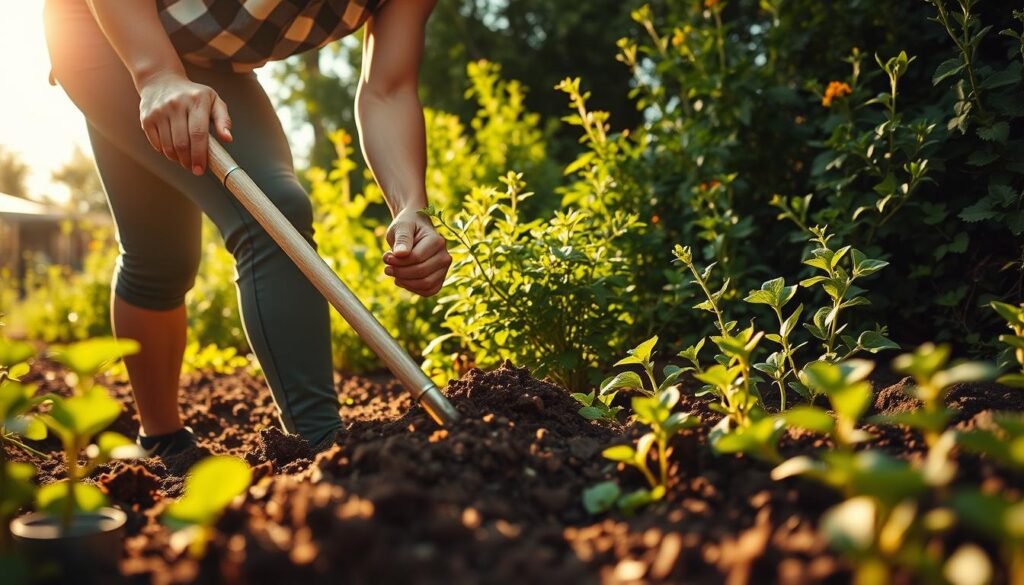Did you know that three hours of gardening can compare to approximately one hour of intensive workouts in the gym? I was amazed when I first learned after asking how many calories does gardening burn. Gardening, often seen as a relaxing pastime, can actually be a powerful form of physical activity.
When I spend time in my garden, I feel the burn in my muscles, especially after tasks like digging or weeding. It turns out, these activities can burn between 175-300 calories per hour for light tasks and up to 450-550 calories for heavier ones. The formula (MET x body weight in Kg x 3.5) ÷ 200, from the Compendium of Physical Activities, helps calculate this.
In this article, I’ll break down how to start gardening and how it can boost your fitness. Stay tuned to discover how your favorite hobby can help you stay in shape!
Key Takeaways
- Gardening can burn significant calories, comparable to gym workouts.
- Light tasks burn 175-300 calories per hour, while heavy tasks burn up to 550.
- Digging and weeding engage multiple muscle groups.
- Regular gardening improves fitness and health.
- It’s a fun and effective way to stay active.
Gardening as a Fun and Effective Workout
Gardening transformed my fitness routine in ways I never expected. What started as a hobby to beautify my yard became a full-body workout. I quickly realized that tasks like weeding, planting, and pushing a wheelbarrow were more than just chores—they were opportunities to stay active.
One of my favorite gardening tasks is mowing the lawn. Switching from a power mower to a push mower made a huge difference. According to fitness expert Joshua Margolis, this simple change can help burn extra calories while engaging your legs, core, and upper body. It’s a win-win for both your garden and your health.
My Personal Journey into Gardening Fitness
I never thought of gardening as exercise until I noticed how sore I felt after a day in the garden. Tasks like digging and weeding worked muscles I didn’t even know I had. Over time, I began to see my garden as a place to nurture both plants and my body. However, don’t forget to be productive while working on your garden, and you can look at my guide for bucket gardening for some tips.
Here’s a breakdown of some common gardening tasks and their fitness benefits:
| Task | Calories Burned (30 Minutes) | Muscles Worked |
|---|---|---|
| Digging | 150-197 | Arms, shoulders, core |
| Planting | 135-177 | Legs, back, hands |
| Weeding | 138-166 | Core, arms, legs |
| Push Mowing | 150-200 | Legs, core, upper body |
Benefits of Combining Nature with Exercise
Gardening offers dual benefits: it nurtures nature and boosts your health. Regular gardening improves cardiovascular health, builds strength, and enhances mental well-being. Spending time outdoors reduces stress and anxiety, making it a holistic activity.
Even simple changes, like using hand tools instead of power tools, can increase the intensity of your workout. Gardening is accessible to everyone, regardless of fitness level. It’s a fun and effective way to stay active while enjoying the beauty of nature.
Factors Influencing Calorie Burn in Gardening
The calorie burn from gardening depends on several key factors. Your body weight, the intensity of your effort, and the type of task all play a role. Understanding these elements can help you maximize the fitness benefits of your time in the garden.

Impact of Body Weight and Intensity
Body weight significantly affects how much energy you expend. For example, a person weighing 180 pounds using a hoe (MET of 5.0) burns about 428 calories in one hour. The Compendium of Physical Activities highlights that heavier individuals burn more calories during the same task compared to lighter ones.
Intensity also matters. Pushing a lawn mower or digging requires more effort than light weeding. The more you engage your muscles, the higher the calorie burn. Proper technique, like bending and lifting correctly, can further enhance your workout.
Differences Between Light and Heavy Gardening Tasks
Not all gardening tasks are equal. Light activities, such as watering plants, burn fewer calories. Heavier tasks, like shoveling or hauling soil, can significantly increase energy expenditure. Here’s a comparison of common tasks and their calorie burn for a 180-pound person:
| Task | Calories Burned (1 Hour) | Intensity Level |
|---|---|---|
| Watering Plants | 154 | Light |
| Weeding | 231 | Moderate |
| Digging | 428 | Heavy |
| Push Mowing | 450 | Heavy |
Whether you’re spending 30 minutes or an hour in the garden, the type of task and your effort level determine the overall calorie burn. By mixing light and heavy activities, you can create a balanced workout that benefits both your garden and your health.
Exploring “how many calories does gardening burn” Through Various Tasks
Gardening isn’t just a hobby—it’s a calorie-burning powerhouse. Whether you’re planting flowers in containers or mowing the lawn, every task contributes to your fitness. Let’s dive into the numbers and see how your gardening activities stack up.

Calorie Estimates for Common Gardening Activities
Not all gardening tasks are created equal. Here’s a breakdown of what you can expect to burn per hour:
- Watering Plants: 130 calories
- Potting Plants: 170 calories
- Weeding or General Yard Work: 300 calories
- Intensive Tasks like Tilling: 500 calories
These estimates are based on data from the CDC and Harvard School of Public Health. Switching from electric to manual tools can increase the intensity and calorie burn.
Data Insights from Leading Research and Fitness Experts
Research shows that gardening engages multiple muscle groups, making it a full-body workout. According to fitness experts, tasks like digging and raking work your arms, core, and legs. Even lighter activities, like watering, contribute to your daily physical activity goals.
“Gardening is a fantastic way to stay active without the monotony of traditional workouts.”
Comparing Gardening to Other Daily Physical Activities
How does gardening compare to other activities? Here’s a quick look:
| Activity | Calories Burned (30 Minutes) |
|---|---|
| Gardening (Weeding) | 150 |
| Walking | 150 |
| Vacuuming | 70 |
As you can see, gardening can be just as effective as walking for burning calories. Plus, it’s more enjoyable and rewarding.
To maximize your calorie burn, try mixing light and heavy tasks. For example, alternate between watering and digging. This approach keeps your body engaged and boosts the overall benefit of your gardening workout.
Gardening is a great way to stay active, improve your health, and enjoy the outdoors. With a little effort, your yard can become your personal fitness studio.
Conclusion
Gardening has become my favorite way to stay active. It’s more than just a hobby—it’s a full-body workout that keeps me fit while I enjoy my yard. From digging to weeding, every task engages my muscles and burns energy.
Research shows that even light gardening can help with weight management and build strength. Tasks like pushing a mower or hauling soil work your arms, core, and legs. Over time, these activities add up, making gardening a great way to stay healthy.
I’ve found that spending just an hour in the garden can make a big difference. It’s not just about the physical benefits—gardening also reduces stress and boosts mental well-being. It’s a win-win for both body and mind.
If you’re looking for a fun and effective way to stay active, give gardening a try. Experiment with different tasks to see what works best for you. Whether it’s planting flowers or clearing brush, every effort counts. Enjoy the rewards of a healthier lifestyle while creating a beautiful space.
FAQ
Can gardening really help me stay fit?
Absolutely! Gardening is a fantastic way to stay active. Tasks like digging, weeding, and mowing engage multiple muscle groups, making it a full-body workout.
How does my weight affect the calories I burn while gardening?
Your body weight plays a big role. Heavier individuals tend to burn more calories during physical activities, including gardening, because their bodies work harder to perform the same tasks.
Are there specific gardening tasks that burn more calories?
Yes, tasks like raking leaves, pushing a wheelbarrow, or mowing the lawn with a manual mower are more intense and can help you burn more calories compared to lighter activities like watering plants.
How does gardening compare to other forms of exercise?
Gardening can be just as effective as moderate exercises like walking or cycling. It’s a great way to stay active without needing a gym membership.
Can gardening improve my strength and endurance?
Definitely! Regular gardening tasks build muscle strength, especially in your arms, back, and legs. Over time, it can also boost your stamina and overall fitness level.
Is gardening suitable for all fitness levels?
Yes, gardening is adaptable. You can start with lighter tasks and gradually take on more challenging activities as your fitness improves.
What tools can make gardening more effective for fitness?
Tools like manual mowers, shovels, and wheelbarrows require more physical effort, making them great for burning calories and building strength.
How often should I garden to see fitness benefits?
Aim for at least 30 minutes of gardening a few times a week. Consistency is key to reaping the physical and mental health benefits.

